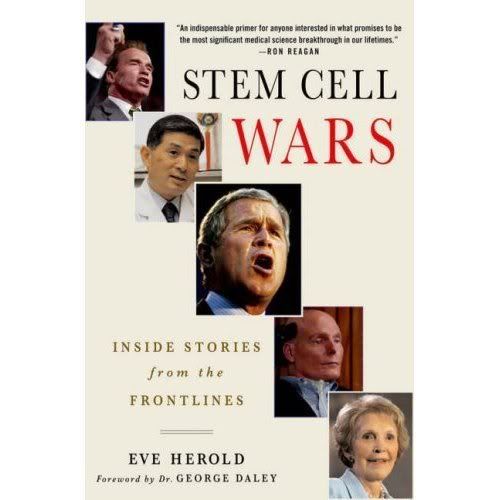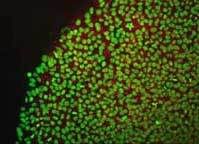|
Neoconservatism, the Catholic Church And Stem Cells
As I have written before embryonic stem cell research ("hESC") is compatible to Christian thought. Objective opinion poll after opinion poll indicates that a clear majority of Americans want this research to go forward with federal funding and federal oversight. As a person afflicted with muscular dystrophy, this is research that could conceivably help me walk again. My neurologist recently told me that while science is now closing in on curing the defect that causes my muscle atrophy via gene therapy, if I am to rebuild enough muscle mass to be ambulatory, stem cell research seems to be my best hope. Over the past few weeks two significant events concerning the research have occurred; the first being required reading for those who want to understand the stem cell debate. Coming on the heels of President Bush's veto of the bi-partisan supported HR810 (this legislation would have significantly increased the number of available hESC lines available for research), a book for which I was profiled was released, Stem Cell Wars. The book lays bare much of the Religious Right's dissembling on this important issue.
Eve Herold's Stem Cell Wars
 With that said, Eve Herold's book is a concise work that explains much of fight over the research. It is an excellent primer for anyone who wants to cut through the obfuscation that surrounds this important national debate. And while it does so from a pro-hESC point of view, it accomplishes the task in honest fashion. For example, it explains the hope and disappointment of South Korean researcher Woo Suk Hwang who dishonestly claimed to have succeeded to have cloned a human embryo. More importantly, the author methodically takes apart the unsubstantiated arguments and exaggerated claims of many opponents of hESC research who constantly claim that adult stem cell research renders hESC research unnecessary. In the chapter entitled "Hijacked by the Politics of Abortion," Ms. Herold details how the Religious Right is digging in its heels to stop the research as means to not only curtail a woman's right to abortion, but to contraception. The author points out how the opposition, which so often resorts to the "slippery slope" argument, is intent on passing legislation that would give an embryo the same rights as a natural born person. The often overlooked implications would be severe. Any woman using an IUD device could then be charged with murder. A very chilling thought, indeed. The only significant criticism is that Ms. Herold has not taken her analysis of the research foes far enough. She understandably miscasts many of the research opponents as "conservatives." In fact there are many conservatives, mostly of a libertarian bent such as Governor Arnold Schwarzenegger (R-Ca.) and Rep. Mike Castle (R-De.) who strongly support the federal funding of hESC research. There are even religious conservatives such as US Senator Orrin Hatch (R-Utah) and former US Senator John Danforth (R-Mo.) who take the same supportive stance. The heart of the Right's opposition lies primarily (although not totally) within the neoconservative movement. Neoconservatism's strategy is to harness ultra-orthodox religious "myths" (Strauss' term, not ours) so as to incorporate its most authoritarian characteristics into the doctrine of America's mainstream denominations. Originally inspired by the teachings of philosopher Leo Strauss, then further developed by neoconservative godfather Irving Kristol and is now being carried to fruition by his son William Kristol. The plan is a simple and straightforward: always be on the offensive by condemning dissenters of good will, inveigh against sound science and most importantly, preach a generic but wrathful orthodoxy that is exclusionary to the point of bitterness. It is a conscious attempt to impose a new American morality by using the power of certain corporate wealth to control the social policies of mainstream Christian denominations while essentially neutralizing the more progressive, but ancient teachings of Judaism. Their goal is a theocracy of sorts, based upon a conglomeration of traditionalist, but always wrathful Christian orthodoxies channeled to serve both a foreign policy based upon American hegemony as well as a lassiez-faire economic climate. Many neoconservatives begin with the premise that that Founding Fathers erred by inserting the Establishment Clause into the Bill of Rights. Irving Kristol is in the forefront of this Strauss inspired argument. Like Strauss, Kristol believes that a strict, orthodox religion is vital to national cohesion. Not only is the "myth" of religious belief necessary to maintain societal order, but the "myth" to be imposed must be one that calls for a vengeful, furious deity that inspires fear into the governed. But the greater issue here is Modernity. Both Straussian-neoconservatives as well as ultra-orthodox Catholics rail against it. Their common opposition to hESC research is classic manifestation of such a belief. Value Pluralism is not acceptable, only submission by all to one selective version of "the truth." Embryonic stem cell research clearly interferes with this scenario because it begins to demystify science and in their eyes, removes the virtue of human heroism (something Eric Cohen has elaborated upon in his writings).(i) And thus Eve Herold's very forgivable shortcoming ties into the second significant event concerning the battle over hESC research. On October 7, 2006 when the Catholic Diocese of Brooklyn held "a convening" on stem cell research at St. John's University's Queens, New York campus. As a advocate of hESC research for the last five years, this event came as no surprise since the current bishop for the area, Nicholas DiMarzio is a member of Opus Dei. The lay group's members and cooperators such as US Senators Rick Santorum (R-Pa.) and Sam Brownback (R-Ks.)are among the research's most outspoken opponents.
The Event Still, I do give these people some credit. They did not censor me and let me say my piece based upon religious belief. And unlike neoconservative opponents of hESC research, I believe their motives come from a purely religious interpretation. For that I respect them. After lunch Eric Cohen gave his presentation.
 EPPC describes its mission as:
"...dedicated to applying the Judeo-Christian moral tradition to critical issues of public policy. From the Cold War to the war on terrorism, from disputes over the role of religion in public life to battles over the nature of the family, EPPC and its scholars have consistently sought to defend the great Western ethical imperatives -- respect for the inherent dignity of the human person, individual freedom and responsibility, justice, the rule of law, and limited government." For the record, many members of EPPC's board of directors are, by no coincidence, deeply involved with the infamous Institute on Religion and Democracy. As Andrew Weaver succinctly reported, the IRD is a hotbed of neoconservative Catholics, sometimes called "Theocons." Mr. Cohen started by immediately attacking my observations on Judaism's support for hESC research. While he admitted that Judaism and other religions supported the research he basically stroked the audience. The example he tried to use against me was that he couldn't see Jacob upon his death asking God to clone him to give him a few more years. He also responded to my description of Judaism as seeing the embryo as being the moral equivalent of water by saying what is the difference between a 40 and a 41-day embryo. I later replied that the 41 day response was irrelevant because the cells are to be extract no later than 14 days and before the appearance of the primitive streak. On this point we chose to disagree. But he was forced to concede that he mischaracterized the death of Jacob. I pointed out that while the Jewish Prophet had already led a long life, while most patients advocating hESC research do not want to live forever, but simply to live a better quality of life over a normal life span. Then Mr. Cohen did something rather interesting. While opposing the research, he told the audience that while he opposed hESC research, it would wrong to claim that no cures will come from it. In fact, he expects medical breakthroughs to result if hESC were fully pursued. But he then said his objection was using embryos as the basis for all future medical research--something that according to the researchers I've spoken to is a significant mischaracterization (it leaves out significant contributions yet to be made by gene therapy and pharmaceutical research). He also gave six possible alternatives to legislation such as HR810 expanding hESC lines, one of which, cell fusion, would--if proven--involve using some of the lines approved by Bush--that didn't go over too well. In essence, while agreeing with the Church's opposition, he undercut much of their argument. Mr. Cohen did get edgy when I "esoterically" commented about the Straussian nature of his thinking. In rebuttal, I stated "My concern is not that you arrive at your conclusions either by Rome or Jerusalem, but by ancient Athens."(ii) Even more telling of Mr. Cohen's neoconservative agenda was his response when one audience member asked if he believed embryos have souls. After some initial hesitation and looking a bit uncomfortable, he replied that he did not know.
The Unhealthy Alliance Eric Cohen is a neoconservative who supported President Bush's invasion of Iraq--a military action strongly opposed by then-Pope John Paul II. Mr. Cohen sees nothing hypocritical about sending natural born Americans to die in an ill-chosen battle in what is supposed to be a war on terrorism, but finds revulsion in using spare embryos destined for destruction to be used to heal the sick and disabled. Straussian neoconservatives constantly celebrate in their writings the virtue in war, as if peace were sinful. And while an Opus Dei Cardinal once floated the idea of excommunicating politicians who support hESC research, he and others affiliated with "the Work" are curiously silent about Catholic politicians such as Senator Rick Santorum who do the bidding of tobacco merchants and enabled a war the Vatican opposed. The neoconservatives are the very "nefarious friends" of the Church who ultimately contribute to apostasy. Wilfred Parsons, SJ warned against making such alliances in 1936. Their ill-intentions are not designed to steel the Church as a vehicle for peace and dignity, but for ivory-towered elitism and plutocracy that will wield Magisterium as a club to stiffle secular as well as religious dissent.
Notes
Neoconservatism, the Catholic Church And Stem Cells | 9 comments (9 topical, 0 hidden)
Neoconservatism, the Catholic Church And Stem Cells | 9 comments (9 topical, 0 hidden)
|
||||||||||||
| ||||||||||||




 print page
print page